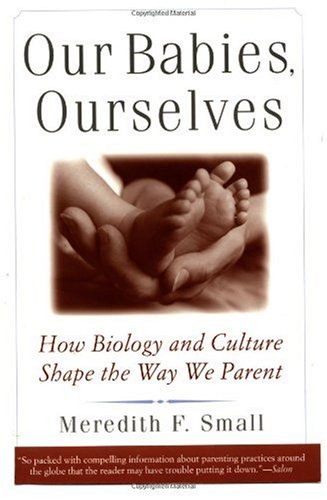Weening Among Human Ancestors
Archaeologists have discovered that since the Pleistocene, humans lave always suckled infants for several years. Using biochemical analysis given human population when its children moved from breast milk to other foods. In one group of skeletons from South Dakota dated between 5500-2000 b.c., children were apparently depending on food other than mother's milk by the time they were twenty months of age.^' Recorded history also tells a similar story. Middle Eastern groups in 3000 B.C. were breast-fed for two to three years, which was the common age of weaning for Hebrew populations. At another North American site near the Missouri River dated to the seventeenth century, researchers were able to determine that infants were breast-fed exclusively for one year and that weaning was between two and six years of age. This work has been confirmed at other sites, where researchers have also found evidence that not so long ago there typically was no abrupt change from breast milk to other foods, as we often think weaning should be, but a gradual change.^ ^
In all cases, this hominid blueprint of the way babies were fed for 99 percent of human history indicates breast milk as the primary or sole Food until two years of age or so, and nursing commonly continuing for several more years.
Notes:
A survey of ancient cultures and estimates of when they weened their children onto other foods.
Folksonomies: evolution breastfeeding
Taxonomies:
/family and parenting/babies and toddlers (0.472058)
/family and parenting/children (0.199468)
/food and drink (0.176446)
Keywords:
breast milk (0.921552 (neutral:0.000000)), Middle Eastern groups (0.771282 (negative:-0.247549)), North American site (0.757241 (neutral:0.000000)), ancient cultures (0.559808 (neutral:0.000000)), Human Ancestors (0.549233 (neutral:0.000000)), biochemical analysis (0.541280 (neutral:0.000000)), hominid blueprint (0.540982 (neutral:0.000000)), abrupt change (0.523418 (neutral:0.000000)), South Dakota (0.520960 (neutral:0.000000)), seventeenth century (0.518256 (neutral:0.000000)), human population (0.516647 (neutral:0.000000)), similar story (0.516489 (neutral:0.000000)), Hebrew populations (0.514916 (neutral:0.000000)), gradual change.^ (0.511466 (neutral:0.000000)), Recorded history (0.511087 (neutral:0.000000)), way babies (0.504792 (neutral:0.000000)), Missouri River (0.503650 (neutral:0.000000)), common age (0.500254 (neutral:0.000000)), sole Food (0.499089 (neutral:0.000000)), human history (0.479985 (neutral:0.000000)), children (0.371716 (neutral:0.000000)), foods (0.366564 (neutral:0.000000)), infants (0.355819 (neutral:0.000000)), b.c. (0.305633 (negative:-0.247549)), researchers (0.289802 (neutral:0.000000)), Pleistocene (0.285541 (neutral:0.000000)), skeletons (0.277750 (neutral:0.000000)), estimates (0.274282 (neutral:0.000000)), Archaeologists (0.266965 (neutral:0.000000)), percent (0.266228 (neutral:0.000000))
Entities:
South Dakota:StateOrCounty (0.870752 (neutral:0.000000)), Missouri River:GeographicFeature (0.826352 (neutral:0.000000)), North American:FieldTerminology (0.751441 (neutral:0.000000)), twenty months:Quantity (0.751441 (neutral:0.000000)), three years:Quantity (0.751441 (neutral:0.000000)), 99 percent:Quantity (0.751441 (neutral:0.000000)), six years:Quantity (0.751441 (neutral:0.000000)), two years:Quantity (0.751441 (neutral:0.000000)), one year:Quantity (0.751441 (neutral:0.000000))
Concepts:
Milk (0.958360): dbpedia | freebase | opencyc
Ancient history (0.931570): dbpedia | freebase | opencyc
Human (0.882107): dbpedia | freebase | opencyc
Breastfeeding (0.823017): dbpedia | freebase | yago
Breast milk (0.792515): dbpedia | yago
Population (0.713150): website | dbpedia | freebase | opencyc
Prehistory (0.690261): dbpedia | freebase | opencyc
World population (0.610832): website | dbpedia | freebase






